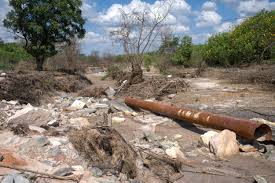
Zambia is confronting a growing environmental and legal challenge as around fifty farmers have filed a lawsuit against Chinese mining company Sino-Metals Leach (SML), a subsidiary of China Nonferrous Mining Corporation.
The plaintiffs allege that a toxic acid spill last February, caused by a dam rupture in the northern copper-rich province, contaminated local rivers, destroyed crops, and affected their health.
“The water became undrinkable, crops failed, and people suffered skin irritations and abdominal pain,” one farmer told local media. The affected communities are seeking compensation amounting to hundreds of millions of dollars.
Sino-Metals Leach has denied responsibility and disputes the severity of the spill. However, an independent assessment by consultancy Drizit suggests that the volume of toxic waste released may be significantly higher than official figures indicate.
Environmental groups are closely watching the case, framing it as a litmus test of Zambia’s capacity to enforce environmental regulations and hold foreign investors accountable.
In response, the Zambian government implemented emergency measures, including applying lime to neutralize the river’s acidity and requiring the company to lead cleanup and restoration operations.
Authorities have emphasized the need for transparency and robust monitoring to prevent similar incidents in the future.
This lawsuit has reignited broader debates over the management of tailings and the environmental responsibilities of multinational mining firms operating in Africa.
Similar disputes have emerged in the Democratic Republic of Congo, Ghana, and Sudan, highlighting ongoing tensions between the economic benefits of mineral extraction and environmental protection.
Zambia, Africa’s second-largest copper producer, relies heavily on mining for GDP and employment, yet incidents such as this underscore the sector’s vulnerabilities. Experts argue that stricter standards for tailings management, comprehensive health monitoring, and enhanced public oversight are essential to ensure that mining activities support both economic growth and the welfare of local communities.
The outcome of this legal case could set a precedent for how Zambia—and potentially other African countries—balances foreign investment with environmental accountability and community rights.



